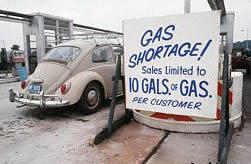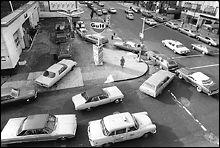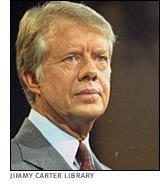Price controls cause shortages
Pennsylvania and other jurisdictions are considering "price controls" for gasoline in the wake of the Katrina created price fluctuations. The Pennsylvania Senate recently passed a bill that limits the amount by which prices can rise during a "disaster emergency."
If this bill passes the House of Representatives, the next emergency will involve more than mere high prices. We will be faced with shortages as a result of the government's ham-handed price control measure.
Prices rise for a reason. Just before labor day weekend, prices rose because retailers and wholesalers feared that replacement supplies would be hard to come by or unavailable. Katrina ruptured pipelines, knocked platforms offline and generally disrupted supplies.
It is a basic law of economics that prices rise when the supply is restricted. Rising prices act as a regulator on the economy and on consumption of goods. Prices convey information. When prices rise, it tells consumers that the supply of certain products is limited. The long term result of a price increase will be that consumer habits will change. The popularity of SUV's will be affected as a result of a gasoline price shock. Our driving habits will change also. Those adjustments don't work when the government interferes with the price. We can whine about the devastation of Katrina forever, but it does not really hit home until we see it on the gas pump as we fill up our car. Only if we are confronted by the actual market price will we know that we must change our habits.
If those prices are prevented from rising, shortages result. Lawmakers cannot change the weather. The lawmakers cannot affect the supply (unless they allow drilling in the ANWR and elsewhere). Forcing the price to remain low while the supply decreases is a recipe for shortages and long lines.
Repeat after me -
"Price controls cause shortages."
If you are still confused, refer to the 1970's.
 Will history repeat itself?
Will history repeat itself?

We paid more at the pump at the beginning of this month. We will continue to pay more. But we have not yet had to spend our evening waiting in a long gas line or searching for an open station. Pennsylvania's bill (and others like it) bring us one step closer to the nightmare of the Carter years. Or the Nixon years.
Similar policies have wrought havoc in the California electric industry:
California's electricity crisis is treated in the media as if it were some sort of natural disaster, like a hurricane. But the only fact of nature operating here is the hard-and-fast rule that whenever you come across a screw-up this big, you know the government is behind it.
The California Legislature created this problem about five years ago when it deregulated the wholesale market for electricity but fixed prices at the retail level, a policy that has made Cuba the happy, prosperous country that it is today.
Even the New York Times seemed to understand this idea when it wrote, "U.S. Price Controls Are Said to Worsen Power Shortage." [You can bet that the Times won't repeat that statement anytime soon - as long as there is a chance of screwing up the economy during a Republican administration.]
The same logic applies to the New York housing industry.
Here is a more academic discussion - complete with graphs.
As usual, Thomas Sowell hits the nail on the head:
Shortages where the government sets prices have been common in countries around the world, for centuries on end, whether these shortages have taken the form of waiting lists, black markets, or other ways of coping with the fact that what people demand at an artificially low price exceeds what other people will supply at such prices.
Years ago, Gary North provided advice on how we can survive and deal with government price controls:
I endured the gas lines of the 1970's because I was only a kid. It was unpleasant, but nothing more. Today, I would have to be the one to juggle a busy work schedule with the gas lines. I could no longer simply count on getting gas on the way home. I would have to allocate sufficient time each week for buying gasoline. The gas line would become a regular part of my calendar, like any other appointment. Evening meetings, social events, lunch appointments, business travel and family outings would be disrupted.
Let's not wait until it is too late before we put a stop to this nonsense. We cannot endure another decade like the 1970's. The Republican revolution of 1980 took place because we were tired of the 1970's. Let's not give in to those who seek a return to that unpleasant, miserable decade.
-------------------------------------------
visit counter added on March 4, 2008
Labels: 1970's, Bravenet, economics, energy, history, price controls


<< Home